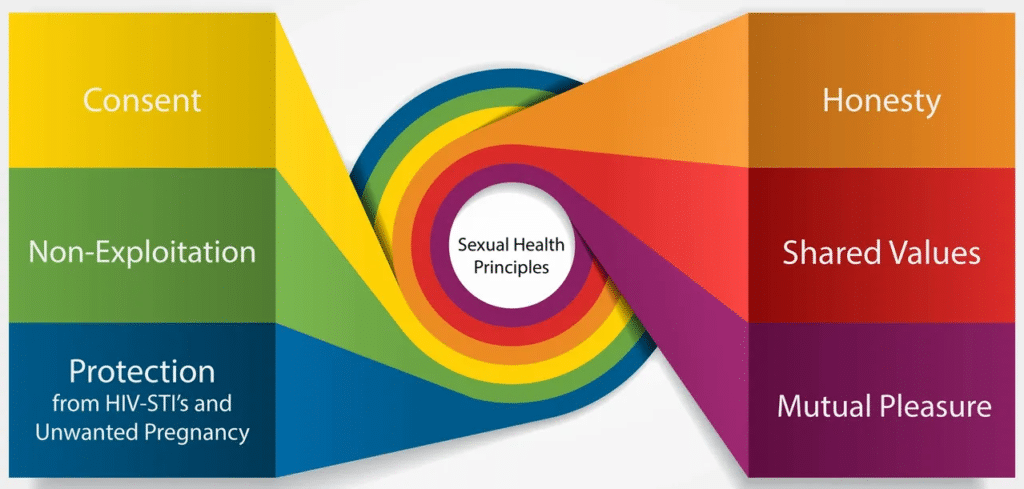Have you ever taken time to reflect on what your sexual health means to you?
Depending on our personal histories and our access to resources (educational, medical, etc.), we may not have an idea of what exactly sexual health means. Historically, sexual health has been understood as simply avoiding unwanted pregnancy or contracting a sexually transmitted infection. This definition, however, is overly narrow and omits many other facets of sexual health. Sexual health is not just the absence of negative consequences––it is also the presence of a safe and pleasurable sex life.
Since 1974, the World Health Organization (WHO), as well as many other organizations, has worked to develop a more inclusive definition of sexual health. The WHO’s current working definition of sexual health is:
“…a state of physical, emotional, mental and social well-being in relation to sexuality; it is not merely the absence of disease, dysfunction or infirmity. Sexual health requires a positive and respectful approach to sexuality and sexual relationships, as well as the possibility of having pleasurable and safe sexual experiences, free of coercion, discrimination and violence. For sexual health to be attained and maintained, the sexual rights of all persons must be respected, protected and fulfilled.” (WHO, 2006a)
This definition explains that sexual health is achieved depending on one’s “access to comprehensive information about sex and sexuality, knowledge about the risks, access to sexual health care, and living in an environment that affirms and promotes sexual health.” Components of sexual health are extensive and include elements like “sexual orientation and gender identity, sexual expression, relationships, and pleasure.” Sexual health is now considered one of the four pillars of health alongside physical, mental, and spiritual health.
These expanded definitions have been amazing advancements in our understanding of sexual health and can also be quite confusing to understand. To address this, Braun-Harvey at The Harvey Institute developed in 2009 what is now known as the Six Principles of Sexual Health, which focuses on creating a set of ground rules that each person can use to construct their own vision of personal sexual health. These six principles can be helpful guidelines to reflect on as a means to develop and create one’s best sexual self.
 Principle 1: Consent
Principle 1: Consent
Consent is one of the most important cornerstones of sexual health and developing healthy sexual relationships. Consent is a widely known and universal sexual health principle that means actively agreeing to engage in a sexual act or relationship with someone. It is letting them know that a specific sexual act is wanted and desired each and every step of the way. Actively establishing consent throughout a sexual interaction creates a safe space for each sexual partner to explore sexual safety, pleasure, and an experience that is consistent with each person’s desires. There is so much more that can be discussed about consent––more for another day!
Principle 2: Non-Exploitation
Non-exploitation is the second principle of sexual health. Exploitation means when one person uses their power or control over another to receive sexual gratification. Exploitation can come in many forms of taking advantage of someone’s vulnerability from a position of power including but not limited to profiting monetarily, socially, or politically from the sexual engagement. Sexual exploitation occurs when a position of power is used for sexual purposes against someone who is more vulnerable.
Principle 3: Honesty
Honesty involves open and direct communication with yourself and your sexual partner about your sexual health, desires, thoughts, wants, and wishes. What does this look like? Honesty in sexual health might look like being open to sexual pleasure, sexual experiences, and sexual education. Without the ability to engage in honesty, sexual relationships may not have effective communication or be able to uphold the other principles of sexual health. Tip: If you find yourself suddenly taken aback about a particular sexual topic that is being discussed on the news or by a friend, take a deep breath and check in with yourself from a place of honesty––what does this topic or question bring up for you, and what would it mean to respond with honesty and vulnerability? This can be quite tricky and can often require a significant amount of self-exploration to understand more about what you honestly think, feel, want, and need when it comes to your sexual health.
Principle 4: Shared Values
Sexual values play an important role in the motivation for sex. Values can be a way to identify one’s sexual standards and ethics. Differences in values between you and your partner can be addressed through an honest, transparent conversation (both with your partner and with yourself) to help bring clarity to your sexual values. Something that might help start the exploration of your sexual health is to reflect on some questions:
- Am I happy with my sexual health?
- Am I comfortable and confident with my sexual health?
- Am I open with my sexual health?
- How have my values and beliefs on sexual health changed over time?
- Am I willing to explore my sexual health and challenge my beliefs?
- What do I need to be sexually happy?
- What satisfies me sexually?
- What do I need sexually from my partner?
- What do I not enjoy?
- Where do I draw the line?
- What doesn’t feel good?
There are many ways to explore your sexual values, and these questions might offer an opportunity to fully explore and reveal what your sexual values might mean to you.
Principle 5: Protection from STI, HIV, and Unwanted Pregnancy
This principle involves the need for anyone engaging in sexual activity to implement a contraception plan and a plan for the prevention of acquiring or transmitting a sexually transmitted infection and/or HIV. This includes access to tests to identify STIs and proper medical attention to address any infection and access to comprehensive medically accurate sexual health care and education. Lack of medically accurate sexual health education and information is a significant problem in the United States. As of October 2021, only 39 states mandate sex education and/or HIV education, and of those states, only 18 require that the program content is medically accurate. Additionally, only 20 states require the provision of contraception with only 16 states requiring an inclusive view of sexual orientation. There is a lot of work to be done in this area! Many adolescents––even those fortunate enough to have school-based sex education––may not be exposed to medically accurate information about HIV, STIs, and contraception.
If you’re interested in learning more, you can explore the CDC website, the National Institute of Health, or Planned Parenthood.
Principle 6: Pleasure
This last pillar of sexual health encompasses pleasure. Pleasure can be a primary motivation for solo-sexual activity and the giving and receiving between sexual partners. According to The Harvey Institute, “Throughout all stages of life, sexual health is the art of balancing one’s sexual safety and responsibility with the lifelong curiosity of pleasure, exploring sexual interests and remaining curious about the ever-changing sources of sexual pleasure.” What feels good for you might not feel good for someone else. Everyone is different when it comes to sexual pleasure. There isn’t a “right way” to experience sexual pleasure. Exploring ways to build and grow pleasure by yourself and with partners can be a crucial part of sexual health!
If you’re interested in further exploration of your sexual health within the context of psychotherapy, these six principles of sexual health may be helpful guideposts. When considering a psychotherapist to assist in the journey, some psychotherapists are experienced only in guiding discussions about the negative consequences of non-consent and exploitation. Choosing a therapist who can address sexual safety and sexual pleasure and satisfaction can provide space for growth and positive change. Therapy that addresses sexual health facilitates discovery of creating a more balanced life of sexual pleasure and safety.
![]()
Wildflower Center for Emotional Health is a therapy practice with offices in Chicago (River North) and Oak Park, IL. We offer in-person services at each of our locations as well as online therapy to anyone in Illinois. We specialize in perinatal and reproductive health, trauma and PTSD, anxiety and depression, relationships, sex and intimacy concerns, and more.Learn More


